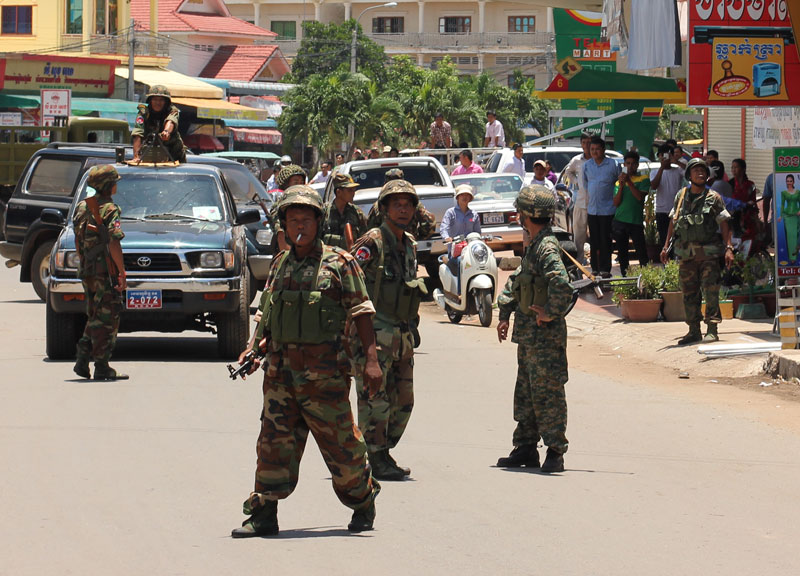KOMPONG CHAM CITY – Armed soldiers and military police prevented opposition leaders Sam Rainsy and Kem Sokha from leading an election campaign march here Sunday, with the pair instead making brief stump speeches for the May 18 council elections in front of militarized roadblocks and at the CNRP’s provincial offices.
Arriving from Phnom Penh at just after 11 a.m., Mr. Rainsy joined Mr. Sokha and CNRP lawmaker-elect Kuoy Bunroeun at the opposition party’s small offices outside the provincial capital, where a crowd of about 500 supporters had gathered, before leading supporters onto the highway for the city.

In Kompong Cham City, red metal gates supported by a line of military police in formation fenced off each road leading from the town’s central roundabout. Soldiers armed with AK-47 rifles milled about a few meters behind each block, while rifle-mounted SUVs set further back aimed squarely toward the arriving campaigners.
“Our plan was to come this way. Why are you blocking the road?,” Mr. Bunroeun asked the military officer in charge of the roadblock going into the center of the city.
“It’s the orders from the top leaders,” the officer responded.
After a tense five minutes of argument, with Mr. Bunroeun repeatedly insisting to the officer that the campaign be allowed to push past the militarized line, Mr. Sokha emerged from his vehicle to call supporters to withdraw to avoid potential violence.
“The CNRP has not come to make war,” the CNRP vice president shouted to the cheering crowd after the tension had defused.
“This is not the front line. The front line is to the west; it is to confront the yuon who are taking our Cambodian land,” he continued, using a term for the Vietnamese that can be derogatory in some contexts.
Mr. Rainsy then announced that the campaign would move across the Mekong River to the market in Thbong Khmom province’s Suong City. The road to the market had a large police and military police presence, but an absence of soldiers.
Seng Kosal, one of the soldiers who was manning the main block to Kompong Cham City, said the military had deployed to protect a nearby conference.
“We came here to provide security and order and we blocked the road because there is a meeting of leaders in there,” he said. “If there is violence, we will repress.”
“Otherwise, we would allow any party to march through here.”
Chet Mann, the deputy commander of a battalion of the Royal Cambodian Armed Forces in Kompong Cham, denied that any military had been deployed to the area Sunday.
“I went to Kompong Cham City to have some Chinese noodles and saw the barricades near the market. Police and military police did it. It is their job,” Colonel Mann said.
“There was no military there,” he said.
Kompong Cham provincial governor Lun Limthai said that the opposition had been specifically refused permission to campaign on the blocked street and a nearby parking lot.
“The city governor did not allow them to [campaign] there because the street is small,” he said. “It affects security, public order and could affect tens of thousands of people.”
“Beside the two places, we do not refuse them,” Mr. Limthai said. “We have many places, so why did they only want these two places? We can consider these things together.”
After delivering short speeches across the river in Suong City, Mr. Rainsy and Mr. Sokha led supporters—unimpeded—back to their party offices west of the city, where more than 500 commune councilors from the Sam Rainsy Party and Human Rights Party were waiting.
On May 18, commune councilors around the country elected in June 2012 will vote in the administrative councils for the districts they fall in, as well for their overall province or city. The Sam Rainsy Party and Human Rights Party merged to form the CNRP in July 2012.
Mr. Bunroeun told the crowd of opposition commune councilors not to forget to vote on election day, laying out the benefits of the CNRP picking up district council seats.
“We have a huge power on the councils—to check the activities of the district governors and the departments at the district level, and we also get the right to make local development plans,” he explained.
“If anyone has any problems, we can summon a meeting for discussion, and people can propose public forums to discuss any issues facing them,” Mr. Bunroeun said. “Don’t let your vote be lost.”
With the brief outbreak of military tension now long out of minds, a more jovial Mr. Sokha rose to make a pitch for the votes of commune councilors from the ruling CPP.
“Do you know which way the wind is blowing now?” Mr. Sokha asked the crowd. “The wind is blowing to the CNRP and you are the representatives of the people. Now the people vote for the CNRP, if you do not vote for the CNRP, you are not representatives of the people.”
“Will you follow the will of the people, or the yuon?”
Mr. Rainsy was more direct, saying the opposition party is now “secretly holding hands” with many lower-level CPP officials, who he said would vote CNRP on May 18.
“We expect a landslide vote,” Mr. Rainsy said.
“No matter what party you are in, we are all Khmer. They [the CPP councilors] know right from wrong, they pity the country and they love justice—and they will be on our side.”
(Additional reporting by Chhorn Chansy)




